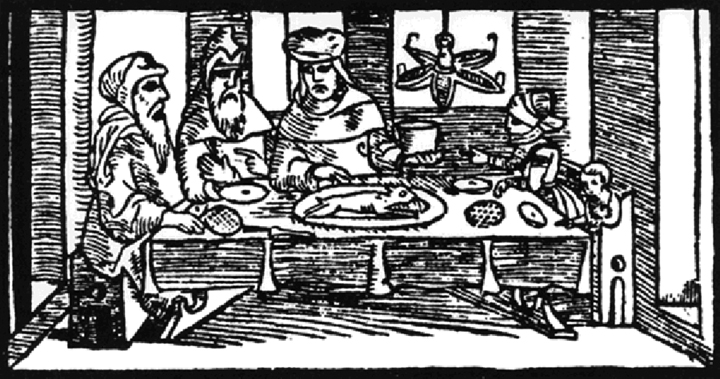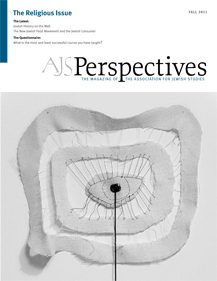
(Prague, Gronem and Gershom ben Solomon Ha-Cohen, 1526).
In light of this broad endeavor to reconceptualize the self, I have been thinking about agency both within and beyond Jewish Studies. Increasing attention to the diverse realms in which the unqualified positive valuation of autonomy cannot be assumed has offered me the beginning of a new engagement with Jewish texts and cultures. In my recent considerations of agency, I have begun pairing a discussion that is millennia old with recent contemporary ethical, cultural, and philosophical perspectives. Premodern Jewish intellectual traditions offer potent counter narratives to the pride of place that autonomy has enjoyed in modern moral theory, philosophy, and religious studies.
The foundational assumptions of normative rabbinic texts hold Jewish selves to be "always already" bound, and indeed obligated, to others and to God. The ritual, civil, and ethical commandments (mitzvot) that comprise the fabric of Jewish piety, express at the same time a basic claim about the obligated nature of the self: in rabbinic literature, Jewish selves are commanded (metzuveh/metzuvah); they are obligated (hayyav/hayyevet). To me this suggests that a dynamic but nonetheless constrained notion of the self is construed as the gift, privilege, and responsibility of membership in the Jewish covenantal community. The normative self of Judaism is imagined as a beast of burden, accepting the "yoke" ('ol) of God's dominion and of the commandments as an ox would accept the yoke of its master. This theological anthropology of human beings as "bound" or "yoked" was never fundamentally contested in premodern Judaism; in the rich repository of traditional Jewish legal and narrative texts, to be a Jewish self means to have entered a social world already "encumbered," as it were, with tasks, duties, and relationships. All of this invites a parallel investigation into post-Foucauldian religious and cultural studies, which foreground questions of how structures of power "command" or "demand" various forms of response in actors and how agency might be reconceived in light of these structures.
Yet any construction of a Jewish theological anthropology based only on these premises will inevitably falter. For the range and types of obligations that are developed in the Jewish classical tradition reflect the imagination and the limits of the elite, often politically marginal, male scholastic leadership of rabbinic Judaism. A critical investigation of what normative premodern Judaism might contribute to the study of agency, autonomy, and freedom must recognize these limits. And this is where it gets interesting. Not only can an intellectual tradition millennia in the making inform contemporary discussions of the human situation, but contemporary discussions of the self can also inform the three-thousand-yearold tradition. What might the often assumed, naturalized, and undertheorized obligations of women in many Jewish cultures tell us about the privileged obligations of scholarly Jewish men? In elite and popular Jewish cultures, primary among women's obligations has been the routine or daily management and care of children. Not the formal education of children, but sustaining and training them to be competent members of the social community has been a female obligation. The ubiquitous yet overlooked labor of women in this realm challenges the iconic model of the self— autonomous, self-sufficient, rights-oriented, and androcentric—so central to classical liberal economic and political theory from an entirely different angle. How might recognition and investigation of this labor reshape and expand the contours of our anthropologies of Jewish religious life? And how, in turn, might this fuller understanding add to current conversations about the nature of the self and its obligations within religious studies?
In my own work, I have found that investigating women's lives in traditional Jewish cultures reveals an instructive gap between subjection that is privileged and chosen and subjection that is imposed and naturalized. Feminist philosophical, ethical, and religious investigations into maternal obligation in particular bring the constancy and urgency of mothers' obligations, in all their affective, spiritual, and political dimensions, into view. For some feminists, ideologies of correct maternal behavior collaborate in limiting women's political influence; for others, mothering is a political act that allows subjugated minorities to resist cultural annihilation. The daily work of sustaining and training a child is just as diversely interpreted: for some, caring for a dependent is an ascetic form of spiritual discipline; for others, it offers evidence of the basic relationality of all human life. These contributions, taken together, form the heart of a nuanced understanding of the self—one defined by both agency and an existential porousness and openness to others. Notwithstanding the profound differences that appear in these perspectives on maternal labor, this literature renders motherwork visible. The best of this literature challenges us to think about mothers' lives and childrearing beyond the narrow mother/child dyad; it demands consideration and critique of how communities apportion the many labors involved with raising the next generation. Once that occurs, reflection on maternal (or, as is the case for many of us these days, parental) obligation becomes integrated and even central to the same considerations of autonomy, agency, obligation, and freedom that are so important in contemporary religious studies and that remain the crucial touch points for religious thought in modern Western life. And, in turn, Jewish thought can enter the contemporary conversation on mothering, as contributor to and beneficiary of a more expansive and nuanced vocabulary of obligation.
At minimum, the attentive, dynamic relationships individuals necessarily cultivate with young children in their care provide the ground of a more fully developed portrait of agency than we have in dominant forms of ethical, philosophical, and religious life. So, too, the normative texts of Judaism challenge long entrenched discourses of self-achievement and autonomy. Both of these conversations point, in important and timely ways, toward how we might begin to replace the pejorative opposites of autonomy and bondage with other possibilities: boundedness, responsiveness, and receptivity.

